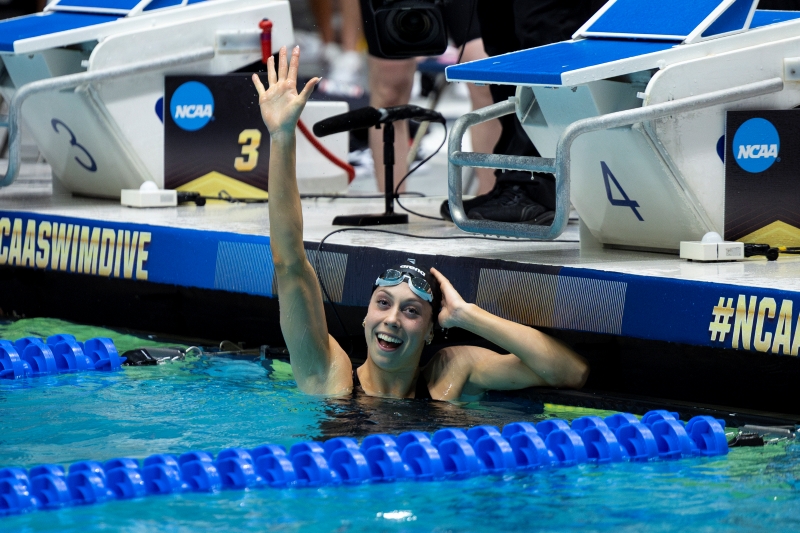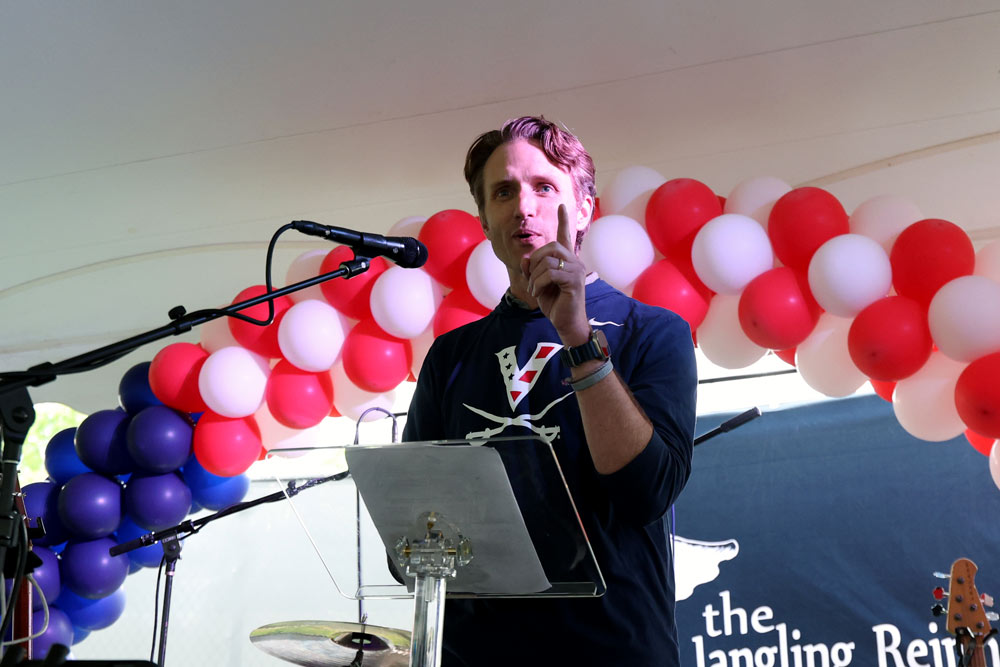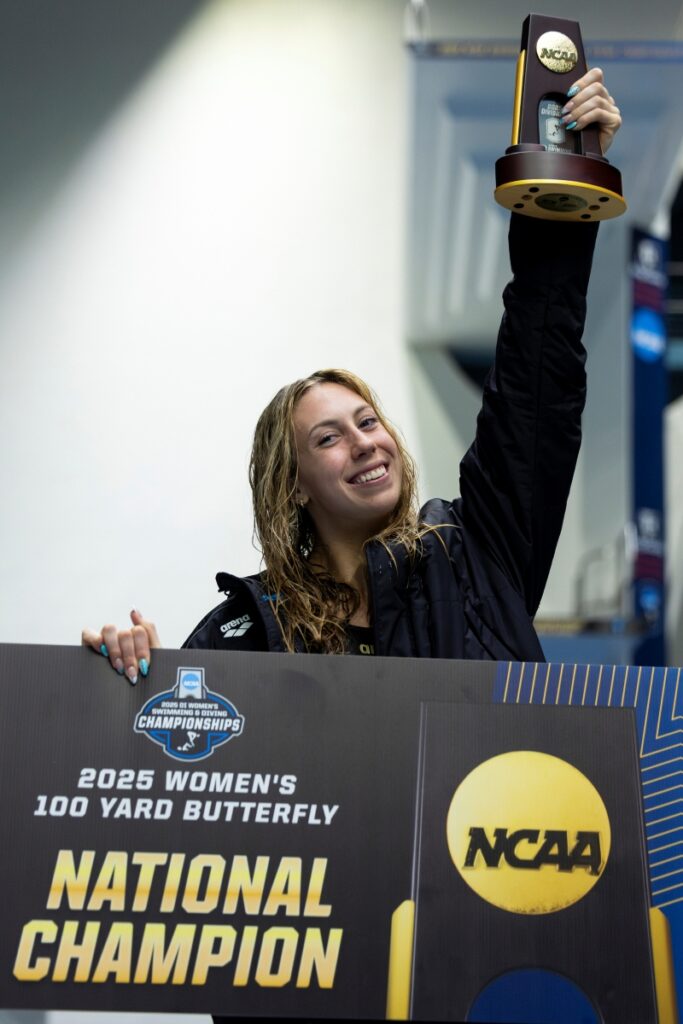No matter the industry or endeavor, performing at the top of one’s game is something all of us strive to achieve. Yet the struggles, strategies, and successes that define many aspects of business and sports alike share some core themes and skills required to reach and maintain the highest standards of excellence.
Professor Jeffrey Lovelace, Director of the McIntire School’s Leadership Minor, regularly invites speakers from the sports world into his classes to recount their experiences. Their stories provide valuable insights to students from across the University, many of whom go on to pursue Commerce degrees.
One prominent Class of ’25 McIntire graduate, student-athlete and four-time Olympic medalist swimmer Gretchen Walsh, has had her own growing list of rarefied moments to draw inspiration from as she continues to set more ambitious goals for herself.
The perspectives of Lovelace and Walsh reflect the profound commonalities between high-level performance by those who excel in sports and athletic training and those found by innovators in business leadership and entrepreneurship.
Accountable to a Team
Over the years, Lovelace has hosted many UVA coaches in his courses. Speakers ranging from Swimming Coach Todd DeSorbo and Wrestling Coach Steve Garland to former Women’s Lacrosse Coach Julie Myers, Women’s Soccer Coach Steve Swanson, and others, have connected leadership concepts taught in the classroom to real-world practice through their first-person accounts. Lovelace says that what they often discuss demonstrates the importance of understanding that leaders are made, not born; the role of organizational culture and shared values for teams; and the resilience necessary to overcome adversity and uncertainty and to learn from it.
While he believes that the central concepts they talk often about could hold weight in any arena, they are particularly relevant to business.
It starts with accountability and responsibility. “You have goals you’re working towards that you have to deliver on, and you’re going to be held accountable to those results,” says Lovelace. “That very much seems like what we talk about at McIntire and what we push with our students,” he says, referring to the high standards that have come to define the Commerce program.
“Next, there’s a level of teamwork and collaboration required,” Lovelace says. “That’s a theme that goes back to what all of these coaches have talked about.”
Despite her record-breaking career in the pool—something she’s solely responsible for attaining in the moment of competing—Walsh agrees.

“Swimming is obviously a very individual sport, but I was a captain this past year, and over the course of my time at UVA, I’ve really learned what it has meant to be a good teammate and leader in the context of our team,” she reflects. “When I got to McIntire, I saw a whole new perspective of that because I had never been in such a heavily collaborative-reliant environment before. I learned a lot about how when you’re on a team, the best thing you can do is to show up and give that effort. With swimming, I show up every day for my teammates, and I give my best effort for them. I encourage them in the pool.
“And then I brought that same spirit to McIntire and found that it is the translation there. While they’re two different disciplines, so much of what makes a great team and what makes a great leader is the positivity, openness, and curiosity you bring to the table.”
Lovelace points out that collaboration has been key to the McIntire learning experience, especially in the Integrated Core curriculum: “In many of our classes, it’s not just about you as an individual. It’s about operating within this structure of a team to be effective.”
Making Decisions and Being Resilient
Another connection between leaders in sports and business is the need to make tough decisions under pressure. It’s a skill continuously developed at McIntire, one that any Comm major has learned through the rigors of the School’s coursework.

McIntire Professor Jeffrey Lovelace has developed a bond with DeSorbo that was ignited after the swim coach spoke to his students about leadership. (Photo by Matt Riley, University Communications)
“We really push our students to think about it,” Lovelace stresses. “How are you making decisions? How do you do it when you don’t have all the information? Or when you don’t have time? That speaks to the McIntire way.”
But figuring out how to bounce back from difficulties or even after making the wrong decisions can prove just as essential.
Lovelace feels that being resilient and handling hardship or failure need to be discussed more with both aspiring businesspeople and student-athletes. “You live those experiences,” he says, noting that despite the UVA Women’s Swim team’s incredible run of winning five successive national championships, their unusual level of victory is just that: not the most likely outcome. “How do you take feedback and continue to learn and grow in the face of other people competing? That’s very much reflective of the business environment as well,” he says. “How do you take stock of your environment and learn how to continuously improve and innovate and get better at what you’re doing? Those are themes that we try to teach to our students all the time.”
Having enjoyed unheard of success in accumulating her world records, two gold and two silver Olympic medals, and a very long list of accolades both in the pool and for academics, Walsh may not be the best example of someone who had to learn from profound shortcomings or critical missteps. Yet she’s remained heavily invested in her own accomplishments to a level that many of her peers may not have been.
 “Swimming has always taught me to give 100% effort no matter what,” she says. “Sometimes that can be burdensome for me because maybe I could chill out a little bit and not care as much—but I genuinely care about the things I do.”
“Swimming has always taught me to give 100% effort no matter what,” she says. “Sometimes that can be burdensome for me because maybe I could chill out a little bit and not care as much—but I genuinely care about the things I do.”
That care has also meant cultivating a deep understanding of how to generate value, something which Walsh began capitalizing on through NIL (name, image, and likeness) potential while still at the Comm School and in the thick of being a rigorously studious and competitive UVA student-athlete.
“Profiting off of NIL was important to me because I had this opportunity that so many former athletes didn’t have. I felt the need to make the most of it,” she explains. “In the classroom as well, I knew that I was going to be learning things that were going to be helping me in my career as a professional swimmer—and then also in whatever comes next. The dedication from swimming has translated into every aspect of my life, especially with school and NIL.”
To handle NIL responsibilities on top of her work in the pool and the classroom, Walsh understandably needed to hire an agent, regardless that she had still been on the hook to tend to photoshoots, interviews, podcasts, social media posts, and more—including applying negotiation skills to advocate for herself. As a McIntire student, she was able to apply her developing expertise to navigating contracts both for her and her sister, Alex (A&S ’24), with whom she endorses the Walsh Sister line for SwimOutlet’s Sporti brand. With a packed Comm schedule, swim competitions, and entrepreneurial engagements, it’s no wonder she relied heavily on goal setting and strategic planning along the way to stay a world-renowned leader in her sport.
Time, Technique, and Staying Motivated to Succeed
Walsh’s experience on Grounds represents how an athlete’s focus on goals and performance metrics could be applicable to strategic planning in business environments.
“I felt like I was really good at my Strategy and Systems class because I have a mind for efficiency and how to get things done in a way that is productive—and as quick as possible,” says Walsh. “Because that’s kind of how swimming is: The technique is perfect, but it’s going fast as well. I have a mind trained like that just from swimming.”
While she acknowledges it may not necessarily translate back directly into her training, strategic planning and time management were of paramount importance for her to succeed on all fronts.
But facing all of those challenges as a student-athlete—and staying committed—is another story. In business and in sports, motivation and personal growth are critical.
“Once I have a goal and once I know what I want to do, I will never back down from that,” asserts Walsh. “I really don’t ever like to accept failure. In a lot of ways, that motivated me to know that quitting wasn’t going to be an option. No matter how much stress I was under or how long it took, I knew that there was going to be light at the end of the tunnel.”
Lovelace is continually impressed by the ways in which student-athletes like Walsh reflect on concepts such as motivation and servant leadership, and how they connect to the teams they are a part of and the relationship to the culture of an organization.
“When it comes to being inspirational and conveying information to get everybody on the same page, that idea of power and influence is particularly well-attuned to connecting with those you lead. In my Strategic Leadership class, we discuss structuring goals over time for organizations with applied cases, and I find that the athletes are particularly good at setting those goals for organizations because they know what it means to have metrics tied to success,” he insists. “They’re specific. They’re measurable.”
For business executives and coaches of teams, demonstrating an irrepressible passion for the work involved has the potential to motivate any disenchanted group. In his experience with successful leaders, Lovelace posits that the coaches who speak in his courses are particularly effective with their messages because they have no qualms about letting their guard down. It’s why he says they seem to resonate so deeply with students: “Inherently, they’re vulnerable about their development as leaders and when they’ve had crucible moments that have allowed them to grow. They’re willing to talk about the times when they haven’t lived up to that perfect standard. Students get the sense that this is a process, and you’re not going to be the best right away.”



